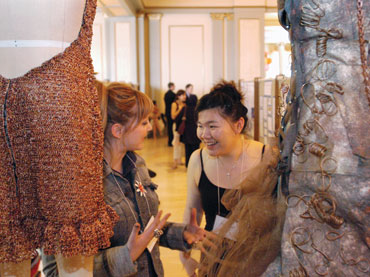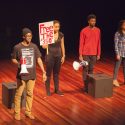Symposium spotlights undergraduate student research
It’s a rare occasion when student researchers, artists, scientists and performers are invited to showcase their creativity in a single venue, but that is the exact function of the Undergraduate Symposium.

At a previous Undergraduate Symposium in Memorial Union, an annual program to celebrate research, creative endeavors and service learning done by undergraduates, former human ecology students Jennifer Kittleson (left) and Diana Dewi display their “wearable art,” clothing they created using found objects as part of a textile and apparel design class.
On Thursday, April 16, more than 400 innovative students will present their original work to the university and Madison community in the form of a poster, display, oral presentation or performance at the 11th annual Undergraduate Symposium.
The event is free and open to the public and will be held at 9:45 a.m. in the Great Hall at the Memorial Union.
“We try to get a variety of students interested in this event by not saying it’s only about research or it’s only about the arts,” says assistant vice provost Laurie Mayberry. “We want to showcase the breadth and the depth of the activities students are involved in around campus.”
Mayberry adds that students often regard the symposium as “the highlight of their undergraduate careers.”
“They have an opportunity to use and expand their communication skills on a variety of a level,” she says. “It’s a great professional development experience.”
Mayberry says that in recent years, the symposium has drawn participation from faculty and staff teaching courses, who are requiring their students to present independent research at the symposium in place of a final project.
Deb Houden, a senior lecturer in business and communication arts, has incorporated the symposium in her course syllabus, asking students to research an aspect of family business either independently or with a small group.
Houden’s 22 students have submitted 13 abstracts to be presented at the symposium.
“The symposium really offers students to delve into a topic they’re interested in,” she says. “It’s great from an instructor’s point of view because it gives the students the opportunity to develop their own strengths, their own interests still within the frame of the course but yet be able to use it beyond the course.”
Houden says the most promising projects are the ones where students have used the symposium as an opportunity to research ways to improve their own family business.
“Whenever you get to do something you’re invested in, you tend to get more enthusiastic about it, you tend to stick with it more, you tend to go down avenues that perhaps other people haven’t thought of,” she says.
Two of these students, sophomore Rita Jiang and senior Debbie Cheung, are researching the influence of Confucianism on family businesses in China.
Both Jiang and Cheung grew up in China, and both of their immediate families own family businesses.
Their project will explore four aspects that reflect the influence of Confucianism on Chinese family businesses: family concept, communication, management and the Guanxi network.
“The Chinese have their own way to build a network,” says Cheung. “Guanxi is really from core family extending out to strangers and it’s really based on trustworthiness.”
Jiang and Cheung hope local businesses attending the symposium will garner a better understanding of how to partner with Chinese businesses from their project, Understanding Family Business in China: Leeway to Build Sustainable Business Partnership with Chinese Enterprise.
While Jiang doesn’t anticipate working for her family business, Cheung expects to one day return to China and help out with hers.
Cheung points out that her research will help her bridge the knowledge she’s gained of Western business practices at UW–Madison with the norms of her own culture.
While Houden’s students researched ways to improve businesses, others researched ways to improve education.
Freshmen Pakou Vang and Phoua Xiong will present their research, Computer Science through Scratch, on teaching computer programming to middle school students at the symposium.
Along with their mentor, associate professor of computer science Andrea Arpaci-Dusseau, Vang and Xiong have run an after-school program for fourth- and fifth-graders at Shorewood Elementary School, where they have taught them how to use Scratch, a computer programming application designed for children.
“It’s a very pleasant environment to program in,” says Arpaci-Dusseau. “It’s very easy to create games, interactive art, stories.”
Arpaci-Dusseau says that so far, the children have been very attentive and have shown a lot of enthusiasm. She says she even had to cap the enrollment.
Furthermore, she believes the symposium gives the undergraduates a chance to review everything they’ve done so far and be able to visualize just how much they’ve accomplished.
A few projects have received special recognition for their social and environmental value, and students have been asked to participate in Posters in the Rotunda, an event that displays undergraduate research to Wisconsin legislators in the Capital Rotunda.
One such project is Predicting Consumer Adoption of Plug-In Hybrid Vehicles. Mentor Jessica Guo, assistant professor of civil and environmental engineering, has been working with Undergraduate Research Scholars Ashwini Bharatkumar and freshman Steven Olikara since last fall on ascertaining the local market for the plug-in hybrid electric vehicle (PHEV).
“I think this is a topic that’s really timely for not only Wisconsin, but really nationwide and as we’re thinking about the energy crisis and security and environmental issues,” Guo says.
Olikara, who says the relevance of the research is one of the main reasons he decided to participate, is looking forward to the Symposium.
“We heard about the Undergraduate Research Symposium and thought it’d be an excellent opportunity to share our research,” he says. “I think that’s a necessary part of the research experience — not just the labs and working with professors, but also being able to share it with the community and being able to make your information relevant to the community and connecting it with different people.”
Tags: events, research, student life


